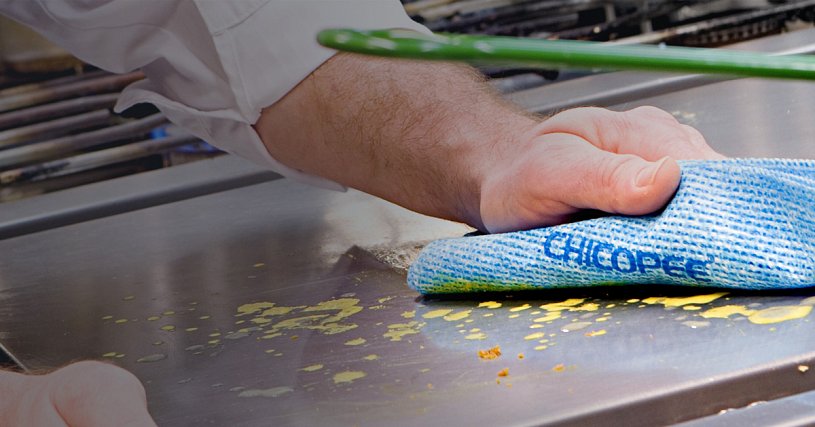Join Chicopee on the path to sustainable cleaning solutions

Discover Chicopee’s commitment to sustainable cleaning solutions. From recycled packaging to compostable wipes, learn how we're reducing environmental impact without sacrificing on performance.
We recognise that sustainability is an ongoing journey, and we’re taking significant steps to ensure that both our products and operations contribute to a cleaner planet.
From using 60% post-consumer recycled (PCR) plastic in our polybags to developing more sustainable cleaning products, we’re making progress every day. Our goal? Providing our customers with ‘true confidence’ in every cleaning task by delivering sustainable solutions that don’t compromise on performance. Here’s how we’re making it happen:
Leading the Way with Sustainable Packaging
We’re excited to share that since August we have begun transitioning the plastic polybags our wipes come in to include 60% post-consumer recycled (PCR) plastic. We’ve also reduced the thickness of our plastic, cutting six tonnes of plastic usage per year – whilst maintaining packaging performance. This move will significantly reduce our environmental footprint and contribute to a circular economy.
In addition, more than 80% of our cartons are already made from 100% recycled materials which are both recyclable and FSC-certified. And if you’re using our J-Cloth® Compostable wipes, you’ll be glad to know the polybags are compostable too, meeting the DIN EN 13432:2000-12 standard.
Building a Sustainable Cleaning Portfolio
At Chicopee, our sustainable solutions are as varied as the industries we serve. We understand that sustainable cleaning encompasses a range of needs and solutions. Whether your requirements call for disposable, reusable, or compostable options, we offer products designed to meet these diverse demands focusing on minimising environmental impact while maintaining a high performance that ensures clean and healthy spaces.
rMicrofibre™: The First 100% Recycled and 100% Microfibre Disposable Wipe
As our newest product to the Chicopee range, rMicrofibre™ sets a new standard in by being the first disposable microfibre wipe made with 100% recycled materials and 100% microfibre to combine both sustainability with performance.
rMicrofibre is tailored for high-risk and high-traffic environments, such as healthcare settings or airports, where effective cleaning is crucial, and where a disposable wipe can reduce the risk of cross-contamination that reusable wipes can cause when laundered, with studies showing 93% of microfibre cloths still contained bacteria after laundering* and could transfer over 30% of bacteria onto the next surface*.
One of the standout benefits of rMicrofibre™ is its superior cleaning performance. The wipe features fibres that are over 80% finer than those in standard reusable microfibre for superior surface contact and is certified to remove 99.97% bacteria when damp with water. This allows it to effectively trap and remove unseen bacteria and dirt using just water, while also being compatible with disinfecting and sanitising products.
How is rMicrofibre sustainable? rMicrofibre is made entirely of recycled materials, giving a new life to plastic bottles and textiles, which contributes to a circular economy to minimise the use of virgin materials, while reducing your CO2 emissions. It delivers an impressive reduction of over 50% less CO2 emissions per kilogram when compared to our traditional non-recycled Microfibre Light*, bringing you one step closer to your sustainability goals.
This aligns with the EU Green Deal’s chemical strategy, which aims to cut greenhouse gas emissions by at least 55% by 2030 through reduced chemical usage and enhanced cleaning efficacy. As a high-performing disposable product, rMicrofibre also eliminates the need for laundering and the reliance on chemicals, since it removes bacteria with just water.
J-Cloth® Compostable: The Only Certified Compostable Foodservice Wipe
J-Cloth Compostable is the original and only certified industrially compostable wipe designed for food preparation and service. It’s FCC certified for food contact and features a colour-coded system for hygiene and cross-contamination prevention. Both the wipe and its polybag are industrially compostable according to DIN EN 13432:2000-12 and can be disposed of in the food waste bin, reducing landfill waste.
Designed for short-term use, such as one shift, J-Cloth Compostable is ideal for quick turnaround environments such as coffee shops & fast-food chains that must deliver a debris & bacteria free table for every customer.
Cross-contamination in food preparation is a leading cause of food poisoning. Keeping surfaces bacteria-free is critical to the health and well-being of your customers & your reputation.
Lavette: The Market-Leading Reusable Foodservice Cloth
For applications requiring durable, reusable solutions, Lavette Super is the leading reusable foodservice cloth. Designed for extended use in foodservice environments, it is built from high-quality, resilient materials that withstand over 40 machine washes at 90ºC without compromising performance. This longevity means fewer replacements and a reduction in waste, supporting more sustainable cleaning practices.
Lavette Super’s open and bulky structure provides superior dirt pickup and efficient absorption of liquids while allowing the wipe to dry quicker so it can stay clean longer.
Looking Ahead
At Chicopee, we believe sustainability is an ongoing journey. As we continue to innovate and improve our product offering, we remain committed to delivering cleaning solutions that not only perform well but also reduce their environmental impact. Together, we’re moving towards a cleaner, greener future – one wipe at a time.

